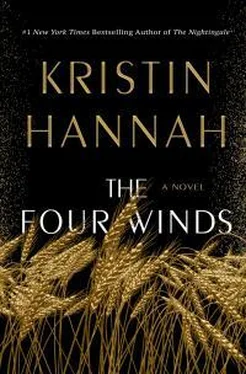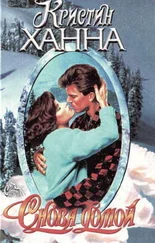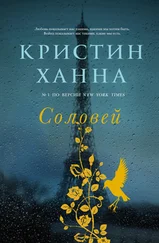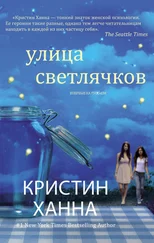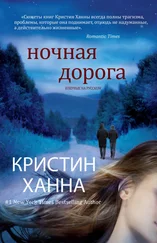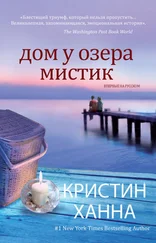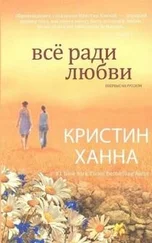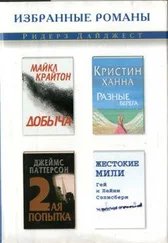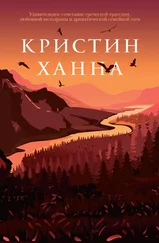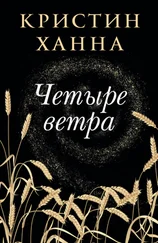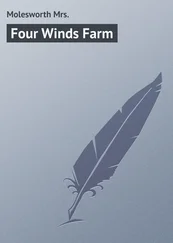In the past thirteen years, she’d learned to love this land and this farm more than she would have imagined possible. In the good years, spring had been a time of joy for her, watching her garden grow, and autumn had been a time of pride; she’d loved seeing her labor on the shelves of the root cellar: jars filled with vegetables and fruits—red tomatoes, glistening peaches, and cinnamon-scented apples. Rolls of spiced pancetta made from pork belly and cured hams hanging from hooks overhead. Boxes overflowing with potatoes and onions and garlic from the garden.
The Martinellis had welcomed Elsa in and she repaid that unexpected kindness with a deep devotion, a fierce love for them and their ways, but even as Elsa had merged deeper into the family, Rafe had veered away. He was unhappy, had been for years, and now Loreda was following her father’s path. Of course she was. It was impossible not to be captivated by Rafe’s charm and caught up in his impossible dreams. His smile could light up the room. He’d fed his impressionable, mercurial daughter a steady diet of dreams when she was young; now he passed along his dissatisfaction. Elsa knew he said things to Loreda, complained of things that he wouldn’t say to his parents or his wife. Loreda had the greatest part of Rafe’s heart, and had from her first breath.
Elsa went back to scrubbing the kitchen floor, and then went on to scrub the floors in all eight rooms, washing dust off the woodwork and windowsills. When she finished that chore, she gathered up the rugs and took them outside and hung them, beating the dirt out of them with a stick.
The wind picked up, ruffled her dress. She paused in beating the rug, sweat running down her face, between her breasts, and tented a hand over her eyes. Past the outhouse, a murky, urine-yellow haze burnished the sky.
Elsa tilted her sun hat back, stared out at the sickly yellow horizon.
Dust storm. The newest scourge of the Great Plains.
The sky changed color, turned red-brown.
Wind picked up, barreled across the farm from the south.
A Russian thistle hit her in the face, tore the skin from her cheek. A tumbleweed spiraled past. A board flew off the chicken coop and cracked into the side of the house.
Rafe and Tony came running out of the barn.
Elsa pulled her bandanna up over her mouth and nose.
The cows mooed angrily and pushed into each other, pointing their bony butts into the dust storm. Static electricity made their tails stand out. A flotilla of birds flew past them, flapping hard, cawing and squawking, outrunning the dust.
Rafe’s Stetson flew off his head and tumbled toward the barbed-wire fence and was caught on a spike. “Get inside,” he yelled. “I’ll take care of the animals.”
“The kids!”
“Mrs. Buslik knows what to do. Go inside.”
Her kids. Out in this.
The wind was howling now, slamming into them, shoving them sideways. Elsa bent into it and fought her way to the house against the wind-driven dust.
She inched up the uneven stairs and across the gritty porch and grabbed the metal doorknob. A current of static electricity knocked her off her feet. She lay there a second, dazed, coughing, trying to breathe.
The door opened.
Rose yanked her to her feet, pulled her into the rattling, howling house.
Elsa and Rose ran from window to window, securing the newspaper and rag coverings over the glass and sills. Dust rained down from the ceilings, wafted from infinitesimal cracks in the window frames and walls. The candles on the makeshift altar blew out. Centipedes crawled out from the walls, hundreds of them, and slithered across the floor, looking for somewhere to hide.
A blast of wind hit the house, so hard it seemed the roof would be torn off.
And the noise.
It was like a locomotive bearing down on them, engines grinding. The house shuddered as if breathing too hard; a banshee wind howled, mad as hell.
The door opened and her husband and Tony staggered in. Tony slammed the door shut behind them and threw the bolt. A crucifix fell to the floor.
Elsa leaned back against the shuddering wall.
Elsa could hear her mother-in-law’s breathy, scratchy voice as she prayed.
Elsa reached sideways, took her hand.
Rafe moved in beside Elsa. She could tell that they were both thinking the same thing: What if the children had been out on the playground? This storm had come up fast. With everything dying these days, there were no strong roots to anchor the soil to the earth. A wind like this could blow whole farms away. At least that was how it felt.
“They’ll be okay,” he said, hacking through the dust.
“How do you know?” she yelled above the sound of the storm.
The despair in her husband’s eyes was all the answer he had.
LOREDA SAT ON THE floor of the quaking schoolhouse, her brother tucked in close beside her, both wearing bandannas drawn over their mouths and noses bandit-style. Ant was trying to be brave, but he flinched every time a particularly fierce gust of wind hit the building and rattled the glass.
Dust rained down from the ceiling. Loreda felt it collecting in her hair, on her shoulders. Wind battered the wooden walls, wailed in a high, almost human scream. Panicked birds kept hitting the glass.
When the storm first struck, Mrs. Buslik had called them all in and made them sit together in the corner farthest from the windows. She’d tried reading a story, but no one could concentrate, and in time no one could hear her voice, so she gave up and closed the book.
There had been at least ten of these dust storms in the past year. One day this spring, the wind and dirt had blown for twelve straight hours, so long that they’d had to cook and eat and do chores in the raging dust.
Grandma and Mom said they should pray.
Pray.
As if lighting candles and kneeling could stop all of this. Clearly, if God was watching the people of the Great Plains, He wanted them to either leave or die.
When the storm finally ended and silence swept into the schoolhouse, the children sat there, traumatized and big-eyed and covered in dirt.
Mrs. Buslik slowly unfolded from her seat on the floor. As she stood, dirt rained down from her lap. The sand outline of her body on the floor remained behind, a dirt design. She went to the door, opened it to reveal a beautiful blue sky.
Loreda saw Mrs. Buslik sigh with relief. The exhalation made her cough. “Okay, kids,” she said in a scratchy voice. “It’s over.”
Ant looked at Loreda. His freckled face was brown with dirt above the bandanna that covered his mouth and nose. By rubbing his eyes, he’d given himself a raccoon look. Tears hung stubbornly onto his lashes, looking like beads of mud.
She pulled down her bandanna. “Come on, Ant,” she said. Her voice was thin and scratchy.
Loreda and Stella and Ant retrieved their book bags and empty lunch pails and left the schoolhouse. Sophia shuffled along behind them, her head hung.
Loreda held Ant’s hand firmly in hers as she stepped from the building.
Town was catastrophe-quiet. The carbide arc streetlamps—such a source of community pride four years ago when they had been installed—were lit because people and cars and animals needed light to find safety in the storm.
They walked up Main Street. Tumbleweeds were caught in the boardwalk. Windows were boarded up, from both the Depression and the dust storms.
When they neared the train depot, Stella said, “It’s gettin’ bad, Lolo,” quietly, as if she were afraid her voice would carry all the way to her parents’ house.
Loreda had no answer to that. In the Martinelli house it had been bad for years. She watched Stella walk away, shoulders hunched as if to protect her from whatever hardship was waiting; she climbed over a new dune of sand that had been swept into the street and turned the corner on her way home. Sophia followed her sister.
Читать дальше
